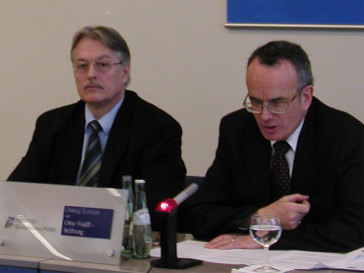IEP Lunch Debate with Sir Stephen WALL: “Europe: Is it crisis as usual, or is this one terminal? ”

Sir Stephen WALL, Chair of the Public Affairs Division at the Hill & Knowlton agency, who has previously served several British governments in important European political capacities including as European political advisor to John Major, Douglas Hurd and Tony Blair and as Great Britain’s long-time permanent representative to the EU, first sketched the development of the EU in retrospect, from the ceremonious Stuttgart Declaration in 1983 to the Treaty of Nice. He identified the Treaty of Maastricht as an important turning point: Following the fall of the Iron Curtain, the impetus for further steps toward integration abated. Indeed, even in the treaties of Nice and Amsterdam, clear warning signs became apparent, which, through the increasing struggle for resources, would eventually make future negotiations in the EU considerably more difficult.
An important piece of evidence for this, Wall explained, was the internal European discord leading up to the Iraq War, which has left behind a lot of bad blood. This already played a roll in the heavily contested search for a successor to Romano Prodi as Commission president. Consequently, the context in which the negotiations and ratification of the constitutional treaty were supposed to take place was considerably biased toward conflict.
Currently, a renaissance of sovereign thought threatens European policy. Even in the smallest decisions, governments fight doggedly for their individual state interests. The most recent example of this is the behavior of the Spanish and French governments when they jealously defended the reputed independence of their national energy concerns.
Given these developments, Stephen Wall raised the question of how some of the European spirit of the EU founding fathers can be revived. In his view, Great Britain will not provide the necessary drive to bring that about. This drive must emanate from the Eurozone, as the success of this group is essential for the further European integration. Wall expressly regretted the fact that nothing has changed in the wait-and-see attitude of the British government toward the Economic and Monetary Union.
In order to counter the nationalistic tendencies in the EU, it is of the highest importance to win back the trust in supranational institutions and thus especially in the European Commission. This trust depends on the successful management of the overall economic situation today. If it comes to set-backs, however, the EU risks receding to a kind of “United Nations of Europe”, meaning a fundamental erosion of the European integration process. According to Wall, the current crisis of the EU may not be “terminal”, but one certainly cannot speak of a “crisis as usual” either.
By: Timo Goosmann
